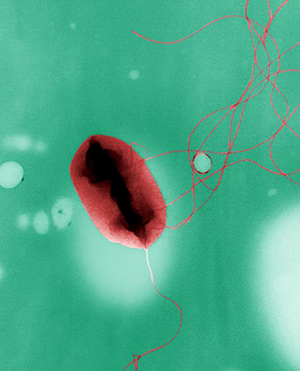Fecal Coliform
 Fecal coliform are a class of bacteria which typically originate in the intestines of warm-blooded animals. The most notable species of this class of bacteria is E. coli (pictured at right).
Fecal coliform are a class of bacteria which typically originate in the intestines of warm-blooded animals. The most notable species of this class of bacteria is E. coli (pictured at right).
For the most part, fecal coliform bacteria are not pathogenic (they won't make you sick), but since they are so strongly associated with feces, they can be used as an indicator of the presence of other harmful bacteria, viruses, and protozoans which are also associated with feces. Some associated diseases include dysentery, typhoid fever, gastroenteritis and hepatitis A.
A single gallon of untreated wastewater can contain over 4 billion fecal coliform bacteria.
Ultraviolet Disinfection
Some I/A systems are fitted with an ultraviolet (UV) disinfection system which is intended to kill most of the harmful organisms in wastewater. Effluent discharge limits are typically around 200 CFU per 100ml.
